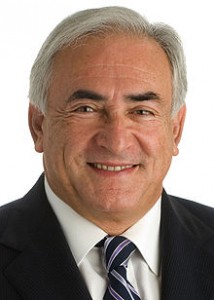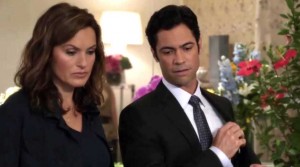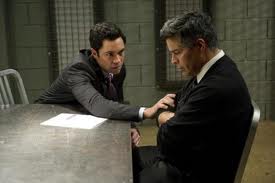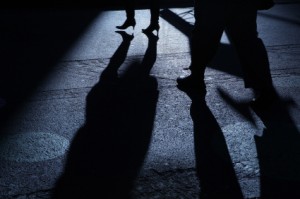The finale of Law & Order: SVU Season 13 aired last Wednesday. As a former sex-crimes prosecutor, I’ve mocked silly episodes about amputation fetishes and sperm donor impersonators. But this season also brought great new characters, blisteringly real story lines, and impeccable timing on controversial issues. What’s most striking about this season, however, is how many lessons from the show could literally save your life. In case you missed some episodes, here are my top ten real-life lessons to take from this season of SVU.
1. You may already be in love with your rapist.
When we think of rape, we tend to picture a stranger lurking in the bushes. But most sexual assaults I saw as a prosecutor were committed by a man the victim knew intimately: an ex-boyfriend or stepfather; a doctor or minister; a teacher or coach; a professional colleague or the guy brought home from a bar. SVU honed in on this theme in Season 13. Personal Fouls featured a youth basketball coach who molested his players. Theatre Tricks included a tech-savvy stalker who was the victim’s neighbor and friend. The victim in Blood Brothers wouldn’t name her wealthy assailant because she hoped he would marry her. Many of us worry about someone breaking into our homes – but what you most need to worry about is who you invite in.
2. Look out for your sons as much as your daughters.
Personal Fouls was a remarkable episode paralleling the Jerry Sandusky / Joe Paterno case. (And it aired before the real scandal broke – I’m still wondering how the writers managed that one.) The episode highlighted sex crimes against boys.
While sexual assaults are the most under-reported crimes in America, assaults against male victims are the most under-reported of all. It’s estimated that 1 in 4 American women and 1 in 6 American men will be the victim of a sexual assault in their lifetime. But hardly any of the male survivors come forward, principally because of the perceived stigma attached to being a victim. SVU’s Detective Amanda Rollins got it right when she said, “Male victims today are where female victims were 40 years ago. It’s the dark ages.” Kudos to SVU for getting people to talk about this subject, and helping male survivors realize they’re not alone.
3. If you are sexually assaulted, tell the police the truth. Immediately.
SVU opened its season with Scorched Earth, a riff on the real Dominique-Strauss Kahn case. The episode featured a fictional hotel maid who claimed she was sexually assaulted by a powerful European politician. When inconsistencies surfaced in her story, the case tanked. In real life, it’s nearly impossible to prosecute a he-said/she-said sex assault when the victim has made seriously conflicting statements. If you’re worried about telling the police something, it’s better to get it out up front.
Delays in reporting rapes are also a common challenge, as highlighted in the episode True Believers, where a college student didn’t come forward immediately, because she was in shock and had her final exams the next day. Victims often have understandable reasons for not making an immediate report of rape, but the sooner a truthful report is made, the stronger the case.
4. Lock your door.
Michael Moore might disagree, but the simple act of locking your door could save your life, and it’s surprisingly often
overlooked. Double Strand featured a serial rapist similar to the real-life East Coast Rapist – a man charged with sexually assaulting multiple women by walking into their homes when a door or window was left open. True Believers featured a rapist who got into a home by slipping in while a woman was bringing in her groceries. When stranger rapes do occur, these two scenarios are often how they start.
5. There is no florist-client privilege.
Frequent TV mentions of the attorney-client and doctor-patient privileges have made viewers believe in other privileges that don’t actually exist. A florist in Blood Brothers argued (unsuccessfully) that his delivery of roses was confidential. I’ve had people argue that information they told their hotel concierge, postman, or yoga instructor was privileged. Not true. You may have a privilege for confidences you tell your doctor, spouse, or religious leader, but in the right circumstances, even those can be circumvented. Keep your secrets between yourself and your lawyer.
6. Never shake a baby.
 In Missing Pieces, the detectives considered Shaken-Baby Syndrome to explain the mysterious death of an infant. As a prosecutor, I saw too many cases of babies who were killed or brain-damaged from being shaken by a frustrated parent. If you feel like you can’t take your baby’s crying one moment longer, set him down in a crib, go to another room, and give yourself some time to recoup. Crying can’t kill a baby – but shaking can.
In Missing Pieces, the detectives considered Shaken-Baby Syndrome to explain the mysterious death of an infant. As a prosecutor, I saw too many cases of babies who were killed or brain-damaged from being shaken by a frustrated parent. If you feel like you can’t take your baby’s crying one moment longer, set him down in a crib, go to another room, and give yourself some time to recoup. Crying can’t kill a baby – but shaking can.
7. The police can lie to you to extract a confession.
In Home Invasion and Strange Beauty, the SVU detectives extracted confessions by lying to the suspects. The Supreme Court has approved of police deception to get a confession. If you’re ever interrogated by the police, you have to tell the truth – but they don’t.
8. Use caution when mixing work with romance.
One of the more interesting continuing plot lines this season involved Detective Olivia Benson’s romance with a dashing ADA played by Harry Connick, Jr. Interoffice romances can always be dicey, and it was heartbreaking – and realistic – to see Olivia lose her first good relationship in a long time after she and Harry crossed some ethical lines in Justice Denied. But the worst thing about it was that Harry was in the show all season, and he didn’t sing even once.
9. Don’t have sex with people under your supervision.
Educated Guess featured a mental-hospital guard who had sex with a patient in his ward. Many jurisdictions have laws making it illegal for prison guards to have sex with prisoners, teachers to have sex with their students, and mental hospital employees to have sex with patients. Even if the prisoner, student, or patient is saying “yes,” there’s too much of a power differential. Don’t mix it up with your clientele.
10. One more reason not to become a prostitute.
Prostitutes are eighteen times more likely to be killed than other women. They often don’t call the police if someone robs, assaults, or rapes them, and many have no family to look for them if they go missing. Predators know this, and serial killers have often preyed on prostitutes. Hunting Ground highlighted this dynamic with a harrowing mash-up of the real-life Long Island Serial Killer and the Craig’s List Killer. My second novel, “Discretion,” is about the case of a high-end escort killed at the U.S. Capitol.
I can’t guarantee you’ll live longer if you watch SVU. But you may just learn something. And if next season is at all like this one, we’ll all have a lot of fun.
Like the blog? Check out my legal thrillers LAW OF ATTRACTION and DISCRETION.
Twitter: @AllisonLeotta








